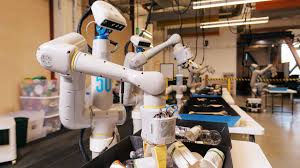Source:-zdnet.com
The smartphone-sized device can alert in real-time if a firefighter’s health is at risk when they’re out fighting fires.
Barcelona-based startup Prometeo has developed an AI-based cognitive health monitoring platform in hope that one day it will be used to monitor the health of firefighters while they are out battling brutal wildfires.
Co-founder Salome Valero explained the development of the platform came about following concerns that were raised by one of their own team members who is a veteran firefighter.
“When the firefighters are fighting against fire, they are breathing in a lot of toxins which can be dangerous for their health … and some of the immediate effects they feel from breathing in smoke is getting headaches. But there is evidence they can suffer respiratory diseases, cancer, and stress disorders,” she told ZDNet, during IBM Cloud Innovation Exchange in Sydney last week.
“The problem is there currently isn’t a lot of data about firefighters’ vitals, but because we have this real-time capability, we are will be able to monitor them.”
Working primarily with firefighters from Catalonia, Prometeo, which was recently announced as the winner of IBM’s Call for Code 2019 competition, has developed a smartphone-sized device that straps on a firefighter’s arm.
It features sensors that measure temperature, humidity levels, and smoke concentration, and can alert in real-time if a firefighter’s health is at risk through colour coded signals of green, yellow, and red.
“We can use it to analyse if the situation of the firefighters is okay, or getting worse, or if it’s a red alert that indicates the firefighter should get out of the fire immediately because their health is in danger,” Prometeo co-founder Josep Rafols said.
See also: IBM announces the finalists of Call for Code 2019 (TechRepublic)
Rafols said even though a minimal viable product has been developed, Prometeo is now looking to improve the product, pointing out how the platform currently relies on Wi-Fi connectivity to transmit data from the senor, which may not be ideal in certain situations.
“Right now, our connectivity solution is using a mobile phone [to hotspot]. We’re aware that some places will not have GSM communication, so one of the things we need to start working on is thinking a little outside of the box of how we will transmit the data when GSM is unavailable,” he said.
At the same time, Rafols said the team recognises the current design needs to be ruggedised.
“The sensors are currently on an arm band that you can just buy from Foot Locker, and obviously that should not be the final solution for the firefighter,” he said.
“In fact, in the initial test, we concluded that having the sensor on the arm is a bad idea because when firefighters clash into a tree the sensor breaks, so we are thinking of a new casing, and the firefighters have said placing it on the chest might be the best approach.”
Eventually, Prometeo hopes through the platform, enough data will be collected in the next two to three years to be used as historical scientific evidence to track the effects smoke has on firefighters’ health.
“This will not prevent fires, this will not prevent natural disaster, obviously, but this will help prevent firefighters from the effects [of firefighting],” Valero said.

 Starting: 1st of Every Month
Starting: 1st of Every Month  +91 8409492687 |
+91 8409492687 |  Contact@DevOpsSchool.com
Contact@DevOpsSchool.com